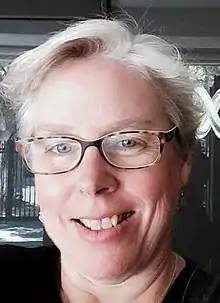Beth Haller | |
|---|---|
 Beth Haller at a radio station in Australia, where she was a Fulbright Scholar in 2015 | |
| Born | 1961 Fort Worth, Texas |
| Occupation(s) | Journalist, editor, college professor |
| Honours | Fulbright Scholar (2015) |
Beth A. Haller (born 1961) is a professor of mass communication and communication studies at Towson University, specializing in the handling of disability in news and new media. She serves on the advisory board of the National Center on Disability and Journalism, and traveled in Australia as a Fulbright Scholar in 2015.
Early life and education
Beth A. Haller was born in Fort Worth, Texas. She attended Baylor University as an undergraduate, as a journalism major, and graduated in 1983.[1] She earned a master's degree in journalism at the University of Maryland College Park, and completed doctoral studies in mass media at Temple University in 1995, with a dissertation titled "Disability rights on the public agenda: Elite news media coverage of the Americans with Disabilities Act."[2]
Career
Haller joined the faculty at Towson University in 1996.[3] She became a full professor in 2008, and retired in 2020. She serves on the advisory board of the National Center on Disability and Journalism,[4] and is a co-founder and director of GADIM, the Global Alliance for Disability in Media and Entertainment.[5]
Books by Haller include Representing Disability in an Ableist World (2010) and Byline of Hope: The Newspaper and Magazine Writing of Helen Keller (2015).[6][7][8] Haller was co-editor of Disability Studies Quarterly from 2003 to 2006.[9] In 2012, Haller was admitted into the Fulbright Specialists Program, and traveled in Australia as a Fulbright scholar in early 2015.[10] While in Australia she spoke on such topics as disability in reality television, film portrayals of disabled people, and disability in science fiction.[11][12]
Beyond academic publications, Haller is frequently interviewed on disability topics by fellow journalists.[13][14][15]
References
- ↑ "Class Notes" Baylor Magazine (Summer 2015).
- ↑ Kathi Wolfe, "Journalism Prof Has the Scoop on Disability Issues and the Media" Independence Today (August 2010).
- ↑ JoAnne C. Broadwater, "The Media's Portrayal of People with Disabilities: What's the Message?" Archived December 22, 2015, at the Wayback Machine Baltimore's Child (February 2012).
- ↑ "NCDJ Advisory Board". National Center on Disability and Journalism. Archived from the original on 2012-11-05. Retrieved 2022-01-11.
- ↑ "Board of Directors". GADIM. Archived from the original on 2022-01-11. Retrieved 2022-01-11.
- ↑ Beth A. Haller, ''Representing Disability in an Ableist World: Essays on Mass Media (Advocado Press 2010). ISBN 9780972118934
- ↑ Celest Martin, "A Culture Reflected: Contemporary Media and Disability" Disability Studies Quarterly 31(2)(2011).
- ↑ "Professor Edits Book on Writings of Helen Keller" Archived 2015-12-22 at the Wayback Machine News and Events, Towson University College of Fine Arts and Communication (August 23, 2015).
- ↑ Beth Haller and Corinne Kirchner, "Editors' Preface" Disability Studies Quarterly 26(4)(Fall 2006).
- ↑ "Interview with Disabilities Media Scholar Beth Haller" Wordgathering 9(1)(March 2015).
- ↑ Shakira Hussein, "Why Do We Still Think Crip-Face is OK?" Crikey (March 9, 2015).
- ↑ Megan Bradshaw, "COFAC Professor's Fulbright Trip Focused on Improving the Lives of Persons with Disabilities" Towson University News (August 5, 2015).
- ↑ Rory Carroll, "Paralympics: US Finally Engages With Games Thanks to Media Interest" The Guardian (August 27, 2012).
- ↑ "Counterspin: Ed Morales on Puerto Rican Debt Crisis, Beth Haller on Disability Rights" Fairness and Accuracy in Reporting (July 31, 2015).
- ↑ Kathi Wolfe, "At Last, a Role Model for 'Queer Crips'" Washington Blade (February 3, 2011).
External links
- Beth Haller's website
- "Diversity Toolbox: Covering Disability Issues" (essay by Haller at the Society of Professional Journalists site)